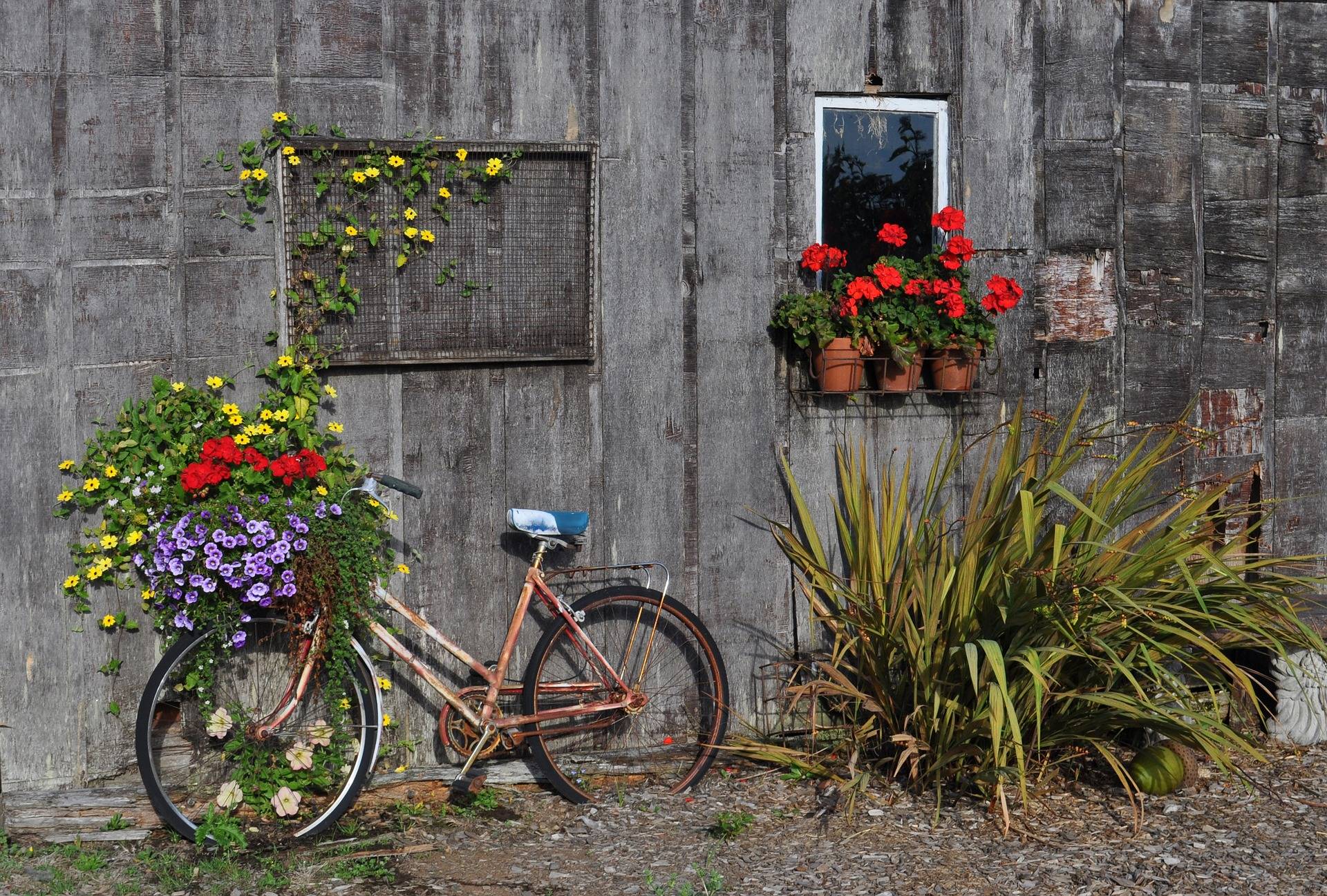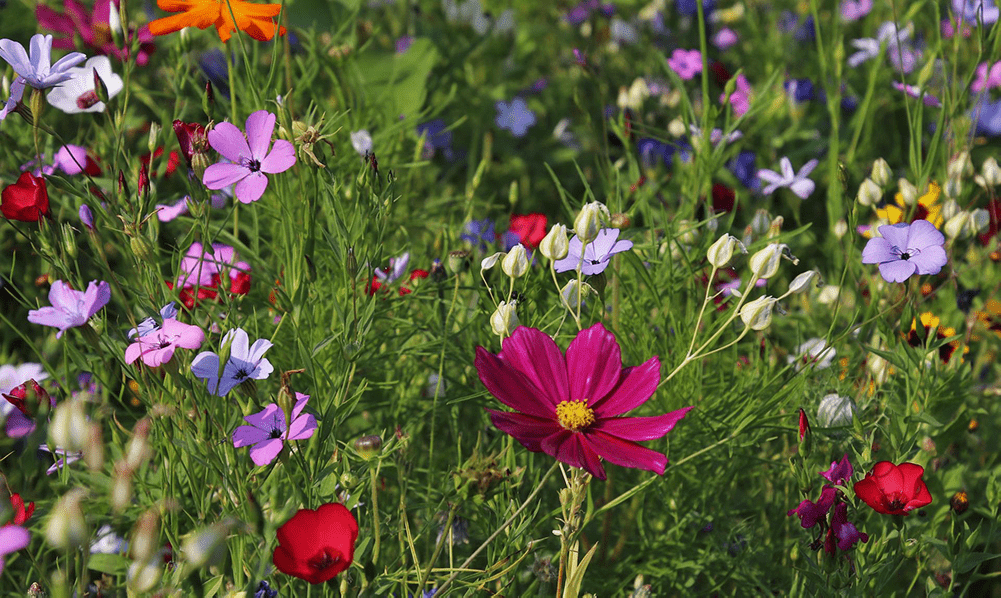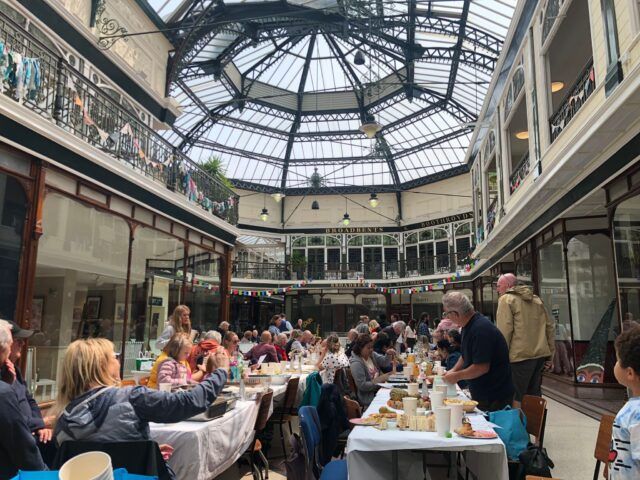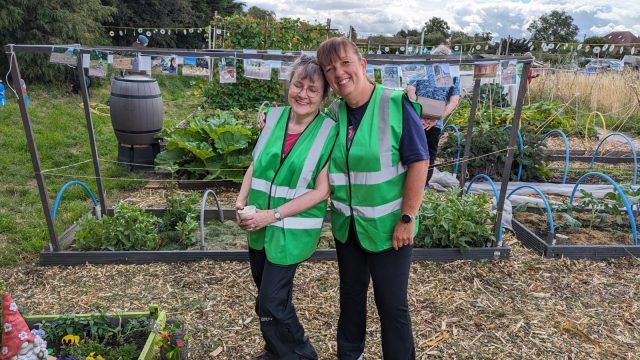10 tips to make your community greener
We can all take small steps to make our communities healthier, greener spaces.

From our community events on the ground to guides, activities and Eden pledges, together we can make small differences that add up to big change. All of our top tips below will help you go greener AND save money too – win win!
1. Food sharing
We’re big advocates of Love Food Hate Waste – getting more from our food has never been more important for both our planet and our wallets. In the UK we waste 6.5 million tonnes of food each year – 4.5 million of which is edible. We also like the Olio app and Too Good to Go for sharing food with your community that could otherwise go to waste.
Looking for cheaper, crowd-pleasing meals? Some of our own personal budget-friendly recipes are listed below – perfect for making in batches and sharing with your community:
- Alex Hollywood’s sticky chicken wings – A one pan wonder made using tasty but cheap chicken wings
- Levi Root’s Caribbean stew – (V) Great for using up veggies
- Our Grainne’s (NI and Scotland Area Manager) spicy pumpkin soup – (V) Perfect for using up butternut squash or pumpkins post Halloween!
- Raymond Blanc’s onion and bacon tart – Even a little bit of left-over bacon will add lots of flavour to this family-friendly tart
Children planting
2. Take a climate pledge with us
Our Eden Project mission is all about working together for the benefit of all living things and it’s really easy to join our cause by taking a climate pledge with us. So far, hundreds of people have committed to use less, make a positive change and use their voices to stand up for what they care about. Learn more about what you can do to help.
3. Create a wildflower meadow
Spring and autumn are the perfect times to sow some wildflower seeds – and wildflowers really aren’t that fussy! They will need a sunny spot (or consider woodland flowers if not), but will generally thrive in poor quality soil – so there’s no need to splash the cash on compost. You’ll only need to create a fine top layer of soil too, so creating a wildflower meadow is an activity people of all ages and abilities can enjoy.
Every little patch matters, as it helps to create a network for our precious pollinators. Make sure you ask permission from any land owners before starting and if this is proving a challenge, consider asking your community to plant wildflower window boxes instead. If you are planting using compost, please ensure you use peat-free. Peat in its natural setting is a precious carbon store so peat-free is much better for our environment.
4. Go car-free for the day
Thursday 22 September is World Car Free Day. It’s great for your pocket, cutting-down emissions and making our streets more welcoming places for pedestrians and neighbours to come together. Of course, it’s not always possible not to use your car, but consider car-sharing with a colleague, taking public transport, cycling or choosing your own car-free day on a day to suit you.
5. Plant a community garden
Community gardens are a wonderful way to bring your community together, grow delicious food from seed and create greener, more biodiverse spaces – what’s not to like? Our ‘how to plant a community garden’ guide shows you how to get started and Sophie and Fissha’s story from the Cardiff Salad Garden is sure to give you some food for thought too.
When planting, wherever possible, using peat-free compost (or even making your own compost!) is a small measure we can all take to protect our environment. Peatlands are precious spaces for wildlife and they’re a huge store of carbon – protecting them is vital in the fight against climate change. Peat-free isn’t always easy to find, but Dobbies garden centres are one outlet that have committed to going peat-free.
Top tip: if you find you have home-grown produce to share, why not donate or trade at a community fridge or via the food sharing platforms listed above?

6. Get the kids involved
Caring about our planet starts early, and getting the kids to appreciate nature in the garden or a local park is a fun and free way to spend an afternoon. The Wildlife Trust has some wonderful nature activity sheets for the little ones, including spotter sheets for every habitat and guides on how to build homes for nature.
You could even ask teachers at your child’s school if they could hold a special assembly or lesson – we like WWF’s climate change learning resources and you can even print a ‘climate heroes’ certificate for the classroom.
7. Write to your MP or sign a petition
Armchair activism (taking a stand from your own home) is collectively very powerful. If you care about your community and our natural world, then you have something to say. Signing up to newsletters from Friends of the Earth, Greenpeace, the RSPB, the Woodland Trust and others will deliver issues, advice and more straight to your inbox. They’ll even pre-populate letters and find your local MP via a quick and easy form.
Great Big Green Week also have advice on how to invite your MP to your Green Week event.
8. Have an allotment, greener home or electric car? Share your experience
Opening up your allotment or sharing your ‘rewilded’ garden can inspire others to grow their own or create biodiverse spaces too. With energy prices soaring, sharing your experiences of greener initiatives such as solar panels, heating systems (or even simple DIY energy saving solutions) can help to break down any fears or misconceptions.
9. Hold a ‘human warming’ event
Spending time together in your community can help keep loneliness and isolation at bay and means you’re only heating and lighting one space instead of several homes. Countries like Peru, who are seeing food inflation rates hit very high levels, have seen communities come together a few days a week to create a big ‘one-pot’ dish from what they have to hand. Coming together and bringing games, food, drink and music/speakers allows everyone to contribute without necessarily spending a penny.
10. Host a Green Big Lunch!
A Big Lunch is a great way to get people together at any point throughout the year and the resources in our free Big Lunch pack are undated. Those lovely crunchy golden leaves and chilly nights might be stopping you having a street Big Lunch, but often community centres and village halls will let you hold an indoor event for free.
Simple ways to make it a Green Big Lunch are to avoid single-use plastics and throwaway items, make it a home-grown veggie Big Lunch, or combine it with activities like wildflower seeding, litter-picking or hold a clothes-swapping event to really work up an appetite!
Make it clear that your neighbours don’t need to spend anything if they don’t want either. Perhaps somebody could bring the chairs? Or a pitcher of squash? A great big pan of veggie chilli or lentil and chickpea dhal are cheap, healthy ways to delight the whole community too.
More like this

How a Southport mum is promoting climate action
Nadia is a Southport mum of two on a mission to inspire and support people in her hometown to build a more sustainable, resilient…

Saying cheers to volunteers with a Big Lunch
In 2024, Emma from the Love Barrow Libraries project organised her first Big Lunch to thank their incredible volunteers!

How Tracy started a community allotment
How Tracy found a passion for planting, growing and community connection.
Hungry for more?
Sign up to our newsletter for a monthly dose of fun ideas, handy information and inspiring good news stories.